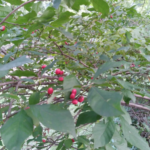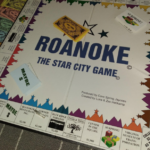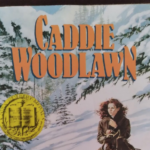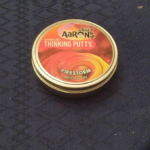The Fruit of the gods
The Virginia woods abound with wild edible treasures, and here is one of the most common, most delectable… and most finicky:
The American persimmon – native to eastern North America – has been called the “Fruit of the gods”, perhaps because as it develops, its character shifts as wildly as a temperamental Greek deity. Before it ripens, the persimmon fruit is mouth-numbingly astringent. In the unlikely event you can choke down enough unripe fruit, it’s even possible to develop a stomach bezoar – a solid mass of indigestible material – the removal of which requires unpleasant surgical procedures. However, fully ripe, the persimmon transforms into one of the sweetest and most delicious of fruits. When is it ripe? It’s usually ready late in the season, often after the first cold spell. At this point the fruit becomes soft and swollen (“bletted”), and it can be easily shaken off the tree. It can also be picked early and ripened indoors.
The history of the persimmon is long and colorful. It was known and enjoyed by the American Indians, who made a kind of fruit leather out of it. The fruit was also savored by the early European settlers. Captain John Smith of Jamestown wrote in his journal: “If a persimmon is not ripe it will draw a man’s mouth awrie with much torment… When it is ripe, it is as delicious as an apricot.”
But that’s not the end of the persimmon’s unique personality. The tree is a species of ebony, and the wood is desirable for making furniture and musical instruments. The seeds can be roasted and ground as a coffee substitute; during the Civil War, they were also used as buttons. Finally, according to reliable folklore, persimmon seeds have the amazing ability to predict the severity of the coming winter. When cut open, the seed kernels will be in the shape of a spoon, fork, or knife. A spoon means lots of snow to shovel; a knife means frigid, cutting winds; a fork means what’s left over, which would obviously be a mild winter. Conversely, if you see a pair of chopsticks, that means you mistook an Asian persimmon for an American persimmon. If you see anything else (a toothpick, a pair of salad tongs, etc), get to the doctor right away and have your bezoar removed.
Groves of persimmons can be found in many forested areas around the Roanoke valley. This fall, take a ramble through the woods to find some delicious persimmons, the perfect combination of ambrosia and fortune cookie! But do it soon, before the snowy winter arrives. The persimmon seeds have spoken.
More from Tim Carr
- Virginia’s Native Allspice

- Wet and Wicked Weather in Western Virginia – Part 3

- Virginia’s Earth-shaking Events

- Roanoke – the Star City Game

- Saving the Planet, one Semi-Immortal Toyota at a time

- Chic(k) Lifestyle – Part 1
- Books to Read Aloud – Caddie Woodlawn

- 5 Random Items We No Longer Want To Do Without





